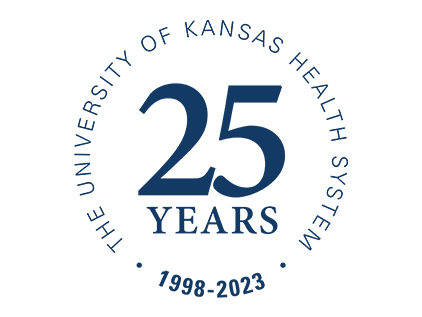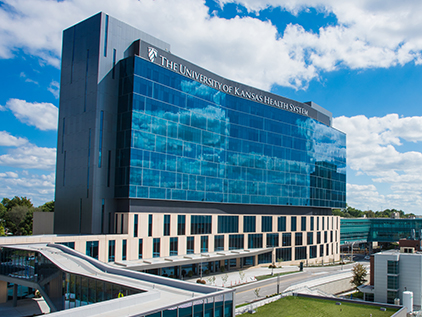
25 Years of Advancing Academic Medicine
Twenty-five years ago, The University of Kansas Hospital became an independent authority with the ability to thrive or fail on its own and without any state appropriations. Since those humble beginnings, we did indeed thrive by always putting patients first. And we’ve stayed true to our guiding formula:
The best outcomes provided in the right way by the very best people lead to growth and financial sustainability.
Our reputation as the region’s premier academic health system was hard-earned through a collective vision and commitment to unmatched patient care. While we are proud of our successes, we remain determined to continue our journey to lead the nation in caring, healing, teaching and discovering.
Hospital origins
With his donation of land in 1905, Simeon Bell, MD, set the stage for academic medicine in Kansas City and the region. His gift led to the establishment of a hospital founded in 1906 as part of the University of Kansas School of Medicine. The first hospital was quickly outgrown, so a new Bell Hospital opened in the same location in 1911 and almost doubled the capacity of its predecessor. By 1924, the hospital had outgrown its space again, so a new hospital was built on a site near the health system’s current main campus, about a mile south of Goat Hill, near West 39th Avenue and Rainbow Boulevard in Kansas City.
The hospital marked an important milestone in 1998 when it became an independent hospital authority, receiving no state funding and no longer part of the School of Medicine. The hospital's official name became The University of Kansas Hospital.
Nearly 20 years later, another milestone occurred. The University of Kansas Hospital joined with the University of Kansas Physicians in 2017 to form The University of Kansas Health System.
Speaker 1:
I am pleased to announce the creation of an independent public authority to operate the hospital portion of the University of Kansas Medical Center.
Bob Page:
We were founded in 1906. By the mid 90s, we were a failing organization based on every metric that mattered. In 1998. We were reborn here as part of the story is told by those who had the courage to lay the groundwork for us to rewrite our history.
Dave Kerr:
By 97, it was pretty obvious that the hospital was in some, some trouble, the reserves were about gone. And we even had staff telling us that within a year or so you may have to consider subsidies for the hospital, nothing gets the Ways and Means Chairman's attention faster than that kind of talk I was very willing to listen,
Speaker 4:
are a huge problem. It was a fiscal pressure that came about it was probably the leading drive to to do something better than what we were doing. Because what we were doing simply wasn't working.
Speaker 5:
Volume was declining. People in the community, when we surveyed really didn't even know what KU hospital was, if it existed, and if it existed, that you only went there, if, if you had to no one really wanted to go there.
Tammy Peterman:
It would take something extraordinary to preserve the hospital. We found it in a different organization, a different governance structure. We found it in a public authority.
Bob Page:
We developed a model statute from looking at a lot of other organizations. And we presented it to the legislature in 1997, many of whom were hearing about the hospital situation for the first time it passed in 1998.
Speaker 1:
There was any doubt in my mind as a lifelong Kansan that we needed to keep the hospital going it needed to survive and thrive. The question was, is was how to do it, I had a lot of really, really fine people advising me that this was the right direction to go.
Tammy Peterman:
We also owed it to the citizens of Kansas, as well as our employees and our physicians to change the course our hospital was on, we just needed a chance to operate differently.
Jon Jackson:
The governor signed it on, I believe, the 17th of February, and we had 225 days then to create a completely new organization separate from the one that we were running, and we had to get it completed by the end of 1998. Or else the the deal was null and void and we would have had to start over from from scratch.
Frank Ross:
There were times when people asked me if I ever doubted that the hospital would make it. No, I never doubted it. There were times when I was just startled by the success and the way it was coming. There were several landmark things that occurred in the early years that I think put everything in place for where it is today.
Bob Page:
During the first couple of years, there were several transactions that jump started our journey. We bought our cancer program back from Salic. We created Jayhawk primary care, and we significantly enhanced our cardiovascular program by bringing a group of cardiologists and CT surgeons over from a local competitor.
Tammy Peterman:
At the same time we focused on quality and patient satisfaction. We charged nursing with owning patient satisfaction, and began our transformation of nursing through a magnet journey. Our Vice Chair of the Board at that time, Dr. George Farhat reminded us every day that we were in business for one reason only to take great care of our patients, he would often say
Speaker 9:
they should doesn't care how much you know, they know how much you can.
Scott Glasrud:
The strategy of leading with quality and service is a winning strategy. And that will continue to serve the health system well, and you are exporting it to to new entities that the system is acquiring and and it's been great for the state of Kansas.
Speaker 11:
Well, I think everyone should be proud of the great turnaround that took place that has led to the success of a hospital and the hospital is positioned better than any other hospital in this community in most places in the country. For what lays ahead.
Tammy Peterman:
Our guiding formula, our focus on quality service of people has driven our growth. We have the very best people supported in the best and right way. And it is quite remarkable things continue to happen. We're so grateful for all those people who over the last 25 years made this possible and you continue to support the health system and the patients we serve.
Bob Page:
We've come a long way from those early days. We're proud but we're never satisfied. Our vision is to lead the nation in carrying healing teach Seeing and discovering. We are relentless in the pursuit of our vision. We will lead the nation
This shall be a place where the people of Kansas and areas surrounding may enjoy the best medical care available anywhere. – Simeon Bishop Bell, MD
Hospital milestones
